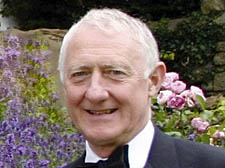|
|
 |
| |

Sir Henry Hodge |
Sir Henry used legal expertise to fight for needy
CAMPAIGNING lawyer, judge and civil rights activist Sir Henry Hodge, who died last week aged 65, began a career that would transform legal services in Camden from the humblest of offices in the High Street.
The first office that the young lawyers who became Hodge, Jones and Allen worked from did not have a telephone for six weeks after opening for business.
Born in Peterborough, Henry Hodge, who would be knighted in 2004, went to boarding school in Essex and then on to study at Oxford.
The firm was established in 1977 when Maggie Rae, a former girlfriend of Henry’s, introduced him to her current flame, a young trainee solicitor called Patrick Allen.
Mr Allen had been discussing the possibility of setting up a legal aid firm to offer services to people in dire need with fellow trainee Peter Jones. Working for Mayfair lawyers Offenbach, the pair were keen to finish their articles and take on radical law work, but they needed a third partner. In stepped Henry and the plan was sealed over a few pints of ale in Covent Garden’s Freemasons Arms pub. They identified areas in which they could use their legal training in the pursuit of social justice, and Hodge, Jones and Allen’s work in criminal, family and housing law begun.
Sir Henry had spent five years working for the Child Poverty Action Group between 1972 and 1977, and as their solicitor would find cases that could test the law and set precedents to help people access welfare rights they were entitled to. As his close friend and law firm partner Mr Allen put it: “He wanted to use the law to help change people’s lives. He would use a case to illustrate a point, and through this, change the benefit rights for one million pensioners.”
The trio decided to set up in Camden Town, as it was close enough to get to the law courts and the fact it was a socially deprived area meant they would have plenty of work on their doorsteps. They became duty solicitors in police stations across north London.
In the early days the firm, which is now one of the leaders of its type in London, got a loan of £2,500 from the Midland bank, which Mr Allen’s parents had to guarantee.
Mr Allen and Henry made a deal – if they were still in business after 12 months, they would treat themselves to a pair of season tickets at Highbury. They still hold them today.
Sir Henry’s energy was such that as well as working for Hodge, Jones and Allen, he sat on various committees and was active in the Labour Party, working as a councillor in Islington in the 1970s, which was where he met his second wife, Margaret. Margaret was to rise through the ranks of the Labour Party and became a minister in 1999, while Sir Henry’s influence manifested itself in other ways. In a career that eventually saw him become a judge, he was given a place on the Law Society’s board, and became a director at Liberty, then the National Council for Civil Liberties.
Sir Henry also sat on the Lord Chancellor’s advisory committee on legal aid and later he turned his expertise to issues surrounding immigration. He was the government’s chief immigration adjudicator in 2001 and then took on the role of the president of the Asylum and Immigration Tribunal in 2005.
Friends recall how Sir Henry’s passion for life gave him the energy he needed to work long hours yet still find time for his family and friends. He would often leave for work at seven in the morning on his large motorbike, and his secretary would arrive to to find mounds of dictation ready to type up by the time they came in, while he had already left to go to court.
As well as following Arsenal, Sir Henry loved the opera. He would spend many weekends at a family home in Norfolk, and threw memorable dinner parties.
Mr Allen said: “He was very jovial, likeable, loyal to his friends and much loved. He made friends who stayed with him for life. He was great fun – he loved telling jokes. He was a big man with a big presence.”
Sir Henry was given an OBE in 1993 and knighted in 2004.
He is survived by his wife Margaret, four children and two grandchildren.
DAN CARRIER |
 |
|
|
 |
Your comments:
I read with interest the obituary and tributes in your paper for Henry Hodge, who sadly passed away last month from leukemia. On Sunday I took part in the London bikeathon which raises money for Leukemia Research. If readers would like to contribute to this important cause, they can sponsor me retrospectively at www.justgiving.com/gregfoxsmith6, or alternatively can contribute to an appeal in Henrys name at http://www.justgiving.com/alastaircampbell/
He was a great man, and is greatly missed.
Yours sincerely,
G. Foxsmith
|
| |
|
 |
|

